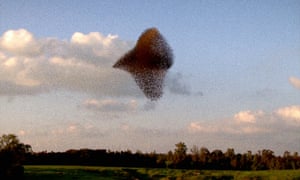A fever dream of the British countryside has been curated here by film-maker Paul Wright, whose last movie was the 2013 fiction feature For Those in Peril. This is a bit different: a rhapsody-montage of archive clips, flickering evocations of bucolic calm, bizarre eccentricity and what looks like real-life folk horror paganism, coming at you with Pathe newsreel voices and spoken arias of agony and ecstasy, all compiled into a mysterious, extended hallucination. Finding a Brexit significance is something that can be done with almost any film nowadays. But this does seem a suitable case for treatment.
This non-narrative work is fascinating, though it’s the kind of assemblage that could so easily look complacent and inert. After all, digital editing technology has made cutting together slo-mo images under a soundtrack dangerously easy for everyone. Shot selection and research is something that isn’t easily taught, but Wright has given us some startling and often compelling juxtapositions, and commissioned some eerie original music by Portishead’s Adrian Utley and Goldfrapp’s Will Gregory. Arcadia – the title comes of course with its own unstated baggage of irony – is a film that calls to mind the work of Andrew Kötting or Guy Maddin, but it stands up alongside them, and the music of Utley and Gregory does much to shape the images, bolstering their meaning and form.
The film starts with classic black-and-white postcard shots of postwar English villages, the cottages, the pubs, the rubicund inhabitants, the tilling of the soil. It is the “Merrie England” idea that is ripe for a debunking, a sudden descent into the brutal reality of hardship, discord, class division and racism. Interestingly, Wright holds on to it, and allows us to absorb the fact that, for many, these tropes – chocolate-boxy and trite though they may appear – were not so very far from reality for many people in the 1950s or even now.
From here, Wright moves on to find the exoticism beneath the surface, presenting tableaux of paganism, nonconformism and naturism, which are elided with the subversive protest ethos of punk, 17th-century levellerism, and music festivals nearer our own time. Maybe these ideas are a bit familiar, but Wright has cleverly found quite a bit of archive material from local TV news reports about eccentric local customs, shot on film, and originally presented to viewers in a humorous tongue-in-cheek spirit but now re-edited and recontextualised to bring out the deadly serious strangeness that was there all along.
Hunting is a rich seam. The foxhunters in their get-up crashing through the hedgerows are like something from Buñuel. Another clip shows a very odd man demonstrating jazz-scat-type hunting cries interspersed with blasts from his horn.

Elsewhere, men in dark trousers and shirtsleeves and side partings are shown running and fighting in the streets over a ball, as if in some English Pamplona. A TV interviewer asks three young boys to talk about what they get up to roaming through the fields all day long. One lad is shown doing a series of dangerous-looking somersaults down what might be called a Blue Remembered Hill. The scene chimes with a later shot of the Cooper’s Hill cheese-rolling in Gloucestershire.
Sometimes, a simple shot of landscape can be breathtaking. Images of starling murmurations have become visual cliches and seeing one often makes you think you’re watching a TV ad for software. But the murmuration image here is staggering: starkly defined, pulsing and shimmering like a migraine. Did Wright tinker with that digitally? I’m not sure.
If I have a quarrel with Wright’s film, it is that, for all its compositional flair, it pursues some ideas that are pretty well established. It’s a film that says that the countryside is not a placid, picturesque place but the site of dark passions, subversions and violence. Precisely. But I found myself thinking of the title of Richard Mabey’s book: The Unofficial Countryside. Arcadia, on the other hand, is The Official Psychogeographic Countryside in All Its Lynchian or Sinclairian Freakiness. And I could have done with a closer look at that very notion of Englishness or Britishness. For the past 20 or 30 years, its agribusiness has been supported by immigrant labour from the EU. That’s now finished. Well, Arcadia is a seductive piece of work. Approach it as you might a rich and strange piece of music.